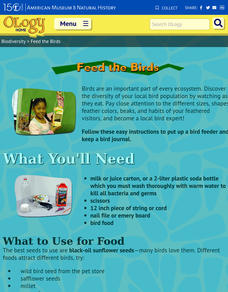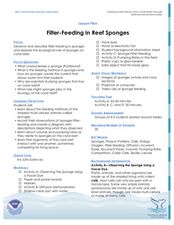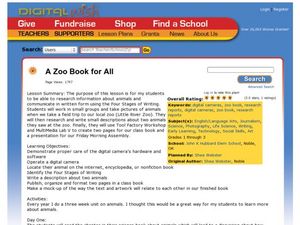American Museum of Natural History
What's This? Feeding
Some species have pretty creative methods for catching food. Young scientists learn about some interesting ways organisms get the nutrients they need by navigating an online interactive lesson that would be suitable for a remote learning...
Teach Engineering
Constructing Sonoran Desert Food Chains and Food Webs
Investigate desert biomes by creating food chains and food webs. Groups first research feeding habits of organisms in the Sonoran Desert. This information helps pupils draw food chains and webs to determine relationship between organisms.
American Museum of Natural History
Feed the Birds
What kinds of birds are common in the area? Young scientists use household supplies to create bird feeders. They then document the birds that come to their feeders by keeping journals.
Desert Discovery
Leaping Lizards
Here is a fine biology lesson plan that introduces youngsters to reptiles. They study their feeding habits, their habitats, and the adaptations they must make to survive in their environments. The outstanding lesson plan includes two...
Curated OER
Filter Feeding in Reef Sponges
Young scholars investigate the role of sponges in our oceans. In this biology lesson, students create a diagram visualizing how sponges bring food into their bodies through a filtering process. Young scholars discuss the connections...
Curated OER
Science: Observing Fish Behavior
Students identify and explain various fish behaviors through observation. Over several months, they watch one fish in the classroom aquarium and record its behaviors in notebooks. They visit a virtual aquarium Website to find...
Curated OER
Inquiry in Science Using an Animal Behavior Model
Students observe a planaria without a microscope and with a stereoscopic microscope. They draw the planaria and describe its motion and eating habits. Students research planarias various body systems and behavior. They design an...
Curated OER
Introduction to Bacteria
Beginning biologists survey several websites to learn about the types, structure, motility, feeding habits, and reproductive methods of bacteria. All websites are linked to the lesson plan, so you can have individuals access it and click...
Curated OER
Tracking Narwhals in Greenland The Ocean Unicorn
Students study the ecology, habitats, geographic range and feeding habits of narwhals. They determine at least three reasons for the decline in the narwhal populations and complete the accompanying worksheets.
Curated OER
A Zoo Book for All
A visit to the local zoo launches an integrated life science/ language arts research project into the habitat, feeding habits, offspring, lifespan, and other interesting facts about animals. Each group selects two animals to photograph...
Curated OER
Mystery Bird Challenge
In this mystery bird challenge worksheet, students use geographic information, feeding habits and a picture to identify a bird, with numerous links to web resources for help.
Curated OER
A Model for Natural Selection- Spaghetti Worms
Does the early bird really get the worm? If so, which color of worm does it prefer? In an exciting and easy week-long field investigation, young field biologists set up a one square meter feeding area for birds. If you have a webcam,...
Curated OER
Growing from Seed
High school or college horticulturists will appreciate this PowerPoint on seed-propagation. It walks them through the science behind seed production and germination as well as the requirements for growing plants from this stage....
Curated OER
Feeding the Birds
Students build bird feeders. In this aviary instructional activity, students build different types of bird feeders. This web page includes information on which type of feeder attracts which birds and what food to use with the certain...
Curated OER
The Turkey Web
Students identify habitat and feeding habits of the wild turkey. In habitat and diet instructional activity students view a demonstration, complete an activity then follow turkey sign.
Exploring Nature Educational Resources
Building A Classroom Food Web
From bears and owls to chipmunks and trees, all life depends on the sun for the energy to survive. Young biologists develop an understanding of this big idea as they arrange this series of plant and animal picture cards into food webs...
Curated OER
Solve the Case!
Students discover the habits of panthers by solving fictitious crime mysteries. In this animal life lesson, students utilize their research from previous lessons to solve mysteries in a panther activity. Students answer questions about...
Curated OER
Raptor Poster Project
Learners create posters about raptors. They synthesize information they read about raptors and select a raptor. They draw a picture of their raptor and include facts relating to where it lives, characteristics, feeding habits, size, name...
Curated OER
Fun With Food Chains
Students explore our ecosystem by researching animal eating habits. In this food chain lesson, students identify the links between predator and prey and the energy that passes between organisms based on what their diet consists of....
Curated OER
Arthropod Data Collection
Students describe the life cycle of various bugs as well as their predators and feeding habits. The class participates in a discussion of the various methods scientists use to gather data including research and experiment. After...
NOAA
It All Runs Downhill
Examine how pollution makes its way into an ocean with help from a model watershed. Scholars use household items to recreate a mini-watershed, equipped with pollutants, that when mixed with rain drain into a model's body of water. After...
Curated OER
Getting Food
Students explore seashore ecosystems. In this marine animal biology instructional activity, students sort photographs of various sea creatures according to their eating habits and discuss each animal's identifiable traits. Students...
Curated OER
Macroinvertebrate Simon Says
Students study the four groups of macroinvertebrates. In groups, they explore the characteristics of macroinvertebrates. Through playing a "Macroinvertebrate Simon Says" game, students discover the adaptations of the animals and their...
Curated OER
Milkweed and Monarch Butterfly Mania
Students explore Earth science by completing a worksheet in class. In this botany lesson, students identify the relationship between the Milkweed plant and the butterflies which regularly feed on its nutrients. Students visit a list of...

























